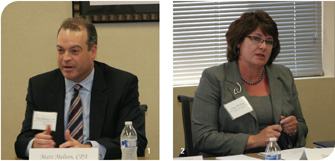
1. Successful wealth management, said Matt Melton, essentially comes down to ensuring that there’s a plan for every client asset. | 2. Dana Abraham, addressing the question of the most pressing concerns among investors, wondered whether they had moved on to other issues in the wake of the 2012 presidential election.
Differing Perspectives
Drawing from a diverse mix of specialists in the wealth-management sector, the session started, appropriately, with participants defining what the term meant for their own organizations. For most, that common denominator was the way that holistic approaches to client advisory had become the operating standard.
“It means a very holistic situation
where we become stewards of our clients assets,” said UMB Bank’s KC Mathews.
“It’s more than just investment management—it’s financial planning, estate planning, insurance. The things we must think about are really multi-generation objectives, and bringing it all together and creating plans to meet or exceed those goals.”
Effective wealth management, said Wells Fargo Advisors’ David Neihart, can’t employ a tunnel vision on investments. “It seems like a lot of people are interested in that one part of their portfolio,” he said, and thus it becomes the adviser’s job to help show a bigger picture of other key aspects, debt being one of them. “If they’re paying real high interest on something, managing debt might be as helpful as making a good investment,” he said.
Despite a lot of background noise about the “1 percent” in this country, the investor class has grown substantially in America. As Scott Holsopple of the Mutual Fund Store noted, “this is the first generation that has sizeable assets that need to be managed.” And because of that, many investors need to be introduced to the concept of envisioning what their retirements might look like, how long they’ll live, and what would be needed to fund that retirement.
At Vantage Investment Partners, said Scott Fletcher, the focus on fixed-income portfolio management presents a different kind of challenge to planning, but ultimately, “we hope to become that trusted adviser for clients, establishing that trust relationship with client and making sure you get them where they need to go.”
The challenge is straight-forward at Tower Wealth Managers, said Bill Koehler: “It’s delivering a good experience. Most investors in the U.S. don’t get a good investment or wealth management experience, in my opinion.” A good experience, he said, is delivered through accessibility, communication and transparency.
Ken Eaton of Stepp and Rothwell listed four components to successful wealth management as a fee-only comprehensive financial planning service: Setting a strategy and leading the financial team, having an intimate understanding of everything that affects clients financially “so they always come to us for advice first,” providing competent, proactive and unbiased advice, and finally, providing Four-Seasons-level service. “When you get to the point where our clients have gotten in life, they need that kind of service,” which stems from giving everyone in the firm the power and responsibility to ensure client satisfaction at all times.
Bob Rippy of Robert W. Baird & Co. cited one metric for gauging success as an adviser: It’s when “your clients come to you on a matter that you’ve never talked to them about,” such as a home refinancing. “That’s when you know you’ve become the wealth management professional they seek.”
In the end, said Matt Melton, it comes down to making sure there’s a plan for every client asset, addressing issues of estate planning, gifting, investing and debt management and then, he said, clarifying the goals. “That’s really when the comprehensive nature of wealth management comes together.”
Investor Sentiments
So what’s keeping investors up at night in the current financial environment?
“I think it’s the noise,” said Northwestern Mutual’s Tracy VanDyke. “There’s so much noise and so much readily available information.” That’s where advisers provide vital services, she said, helping sort through it to determine what information is most relevant to meeting their own goals.
KC Mathews said a primary concern of investors is outliving their assets, a concern common to almost any investor. But there’s a new one emerging: Health-care costs, he said. “They seem to be skyrocketing out of control. Right now, I may be 65 and healthy, but what if I get some type of cancer? Would I have enough assets? What happens to my family, and how do I pass on the assets if something happens to me sooner than anticipated?”
Older investors, said Bob Rippy, the ones who survived the high inflation of the 1970s and early 1980s, always view their overall wealth in terms of purchasing power. With current levels of deficit spending from Washington, “they’re very afraid that this leads to inflation at some point, with the money coming off the printing presses running right now.”